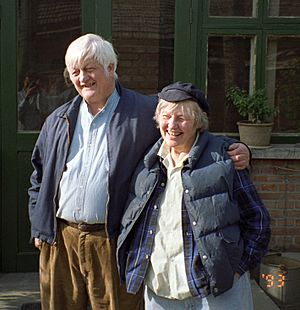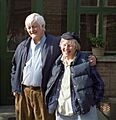Joan Hinton facts for kids
Quick facts for kids
Joan Hinton
|
|
|---|---|

Joan Hinton with her brother Bill at her farm in Beijing
|
|
| Born |
Joan Chase Hinton
October 20, 1921 |
| Died | June 8, 2010 (aged 88) Beijing, China
|
| Other names | Chinese: 寒春 |
| Occupation | nuclear physicist |
| Spouse(s) | Erwin Engst (m. 1949, died 2003) |
| Parents |
|
| Relatives | William H. Hinton (brother) Jean Hinton Rosner |
Joan Hinton (Chinese name: 寒春, Hán Chūn; born October 20, 1921 – died June 8, 2010) was an American scientist. She studied nuclear physics and was one of the few women who worked on the Manhattan Project. This was a secret project to build atomic bombs during World War II.
After 1949, Joan Hinton moved to China. There, she and her husband, Erwin Engst, helped China develop its economy. They focused a lot on improving agriculture. She lived on a dairy farm near Beijing until she passed away in 2010.
Contents
Early Life and Family
Joan Chase Hinton was born in Chicago, Illinois, on October 20, 1921. Her father, Sebastian Hinton, was a lawyer and also invented the jungle gym. Her mother, Carmelita Hinton, was an educator. She founded The Putney School, a special school in Vermont.
Her Family's Background
Joan's sister, Jean Hinton Rosner, worked for civil rights and peace. Joan Hinton's great-grandfather was a famous mathematician named George Boole. Her grandfather, Charles Howard Hinton, was also a mathematician. Her great-aunt, Ethel Lilian Voynich, wrote a popular novel called The Gadfly.
Education and Sports
Joan Hinton went to the Putney School. She was a very good skier. Her skills were so good that she qualified for the 1940 U.S. Ski Team. This team would have competed in the Winter Olympic Games if they had been held that year.
She studied physics at Bennington College. She earned her bachelor's degree in natural science from there. In 1944, Joan Hinton received her doctorate in Physics from the University of Wisconsin.
A Career in Science
Working on Nuclear Science
Joan Hinton worked at Los Alamos for the Manhattan Project. She helped set up special tools to measure neutrons. These tools were used for the Trinity test. This was the first test of an atomic bomb.
She saw the Trinity test happen. She later described it like this:
It was like being at the bottom of an ocean of light. We were bathed in it from all directions. The light withdrew into the bomb as if the bomb sucked it up. Then it turned purple and blue and went up and up and up. We were still talking in whispers when the cloud reached the level where it was struck by the rising sunlight so it cleared out the natural clouds. We saw a cloud that was dark and red at the bottom and daylight at the top. Then suddenly the sound reached us. It was very sharp and rumbled and all the mountains were rumbling with it. We suddenly started talking out loud and felt exposed to the whole world.
Joan Hinton was very upset when the U.S. government dropped atomic bombs on Hiroshima and Nagasaki just three weeks later. She left the Manhattan Project. She then tried to convince the government in Washington to share control of nuclear power with other countries.
Moving to China
Joan's brother, William H. Hinton, had visited China in 1937. He returned after the war. His book, Fanshen: Documentary of Revolution in a Chinese Village, described how land was reformed in communist areas of China.
In March 1948, Joan Hinton traveled to Shanghai. She worked for Soong Ching-ling, who was the widow of President Sun Yat-sen. Joan wanted to connect with the Chinese communists. She saw the communists take control of Beijing in 1949. Then, she moved to Yan'an. There, she married Erwin Engst, who had been working in China since 1946.
After living in caves for five months in 1949, they moved to Inner Mongolia. They worked on a state farm, living simply without electricity or radios. At one point, their village was attacked by bandits. In October 1952, Joan spoke publicly in Beijing. She attended the Asian and Pacific Peace Conference. There, she spoke out against the atomic bombing of Hiroshima. This caused some worry in the U.S. that she might help China develop nuclear weapons.
In May 1955, Joan, Erwin, and their three young children moved to a farm near Xi'an. In April 1966, the family moved to Beijing. They worked as translators and editors during the start of the Cultural Revolution. After 1956, Hinton was allowed to live permanently in China. She chose to keep her U.S. citizenship.
In 1966, Joan Hinton, Erwin Engst, and two other Americans in China signed a big-character poster. This poster was put up at the Foreign Experts Bureau in Beijing. They complained that foreigners were treated too well. They wanted to live and work like Chinese citizens. They asked for "the same living standard and the same level of Chinese staff."
Mao Zedong, China's leader, saw a copy of the poster. He said that "revolutionary foreign experts and their children should be treated the same as the Chinese."
In 1972, Joan Hinton and Erwin Engst started working in agriculture again. They worked at the Beijing Red Star Commune.
In a 1996 interview, after almost 50 years in China, Joan Hinton said they "never intended to stay in China so long, but were too caught up to leave." She and her husband had seen many changes in China. They felt their "socialist dream fall apart" as China started to embrace capitalism. In 2004, she said the economic changes felt like "betrayals of the socialist cause." She noticed more exploitation in Chinese society.
Joan Hinton lived alone after her husband died in 2003. Her three children moved to the United States. She said, "They probably would have stayed if China were still socialist." She kept her American citizenship because it was "convenient for travel." Her son, Yang Heping (Fred Engst), moved back to Beijing in 2007. He became a professor at the University of International Business and Economics.
In 2005, Joan Hinton wrote an essay called "The Second Superpower." She said, "There are two opposing superpowers in the world today: the U.S. on one side, and world public opinion on the other. The first thrives on war. The second demands peace and social justice." She remained active in Beijing, protesting against the war in Iraq.
Personal Life
In 1949, Joan Hinton married Erwin Engst in Yan'an, Shaanxi Province, China. Erwin was an expert in dairy cattle. They had two sons, Bill and Fred Engst, and a daughter, Karen Engst. Joan's father died in 1923 when she was very young.
Joan Hinton passed away in Beijing, China, on June 8, 2010. She was 88 years old.
Images for kids
 | Aurelia Browder |
 | Nannie Helen Burroughs |
 | Michelle Alexander |


